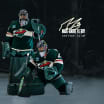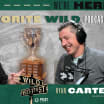That blueprint is one it can use in any game, against any opponent on any night: all four lines staying involved, all six defensemen trusted at any time and a goaltender making all of the saves he needs to.
It was a remarkably efficient victory for the Wild on Sunday, impressive in that the credit can be so evenly distributed.
And while opponents will have better top lines, or perhaps a better top-6, at least on paper, few will be able to continually roll the kind of depth the Wild has, both up front and on the blue line.
"We were able to play everybody," said Wild coach Dean Evason. "And when you have everybody as committed as they are and doing the right things, which we have faith in everybody, all four lines tonight, obviously all our six D ... when that happens, it saves your body, it makes the guys feel real good, makes them feel responsible, and if they continue to get the job done, you continue to put them in those spots."
Every Wild forward skated at least 10:57, with none more than Fiala's 17:29. Fiala is a staple on the team's power play, so he'll almost always be on the higher end of the minutes load.
Every Wild defenseman skated at least 14 minutes, and remarkably, none more than Ryan Suter's 23:36. In years past, Suter has almost always been closer to 30 minutes, especially in the postseason.
In a series where the first three games will be played in five nights, and the first four, if it goes that far, would be played in six, that saved labor will come in handy.
"[It's] tremendously important, and if you look at shift lengths, everybody was definitely below a minute," Evason said. "We talked about that before the series. Everybody talks about Mikko Koivu's line being our fourth line, but we can play them in all situations and feel comfortable. And when you can do that, up and down your lineup and you can do that with your six defensemen, it allows us to hopefully stay fresh and energized for a long series."
In addition to less wear and tear, that trust also fosters an added sense of ownership among everyone in the lineup.
Ryan Hartman, the right wing on Koivu's line, had 13:20 of ice time and didn't accumulate a point, but he was a big-time difference maker with his physicality and his energy. He had three shots on goal and three hits, but with the Wild nursing a two-goal game in the final minute, there was Hartman on the ice with Koivu and Joel Eriksson Ek helping to preserve the victory.
"I think that's the biggest thing, is being able to be trusted," Hartman said. "We have 12 pretty good [forwards] and as long as we're doing our job, we're trying to make it easier on the coach to not have to shorten the bench.
"I think Game 1, we did a good job of letting him be able to roll the lines consistently and trusting that process, and we need to continue to do that so that continues to happen."
That trust is critical against a team like the Canucks, that has two top-heavy lines with plenty of potent scorers on offense. When you're the "road" team like the Wild will be again in Game 2, and you don't have the option to match forward lines.
But if you've got all four lines rolling at once, it really doesn't matter who is on the ice at any given time.
"It's huge. I don't think I know a Stanley Cup team that hasn't had four lines, and that's what you need," said Wild forward Marcus Foligno. "You need guys to rise to the occasion every night. It's not going to be your top guys. It can be the third, fourth-line guys. You need to spread it around."



















